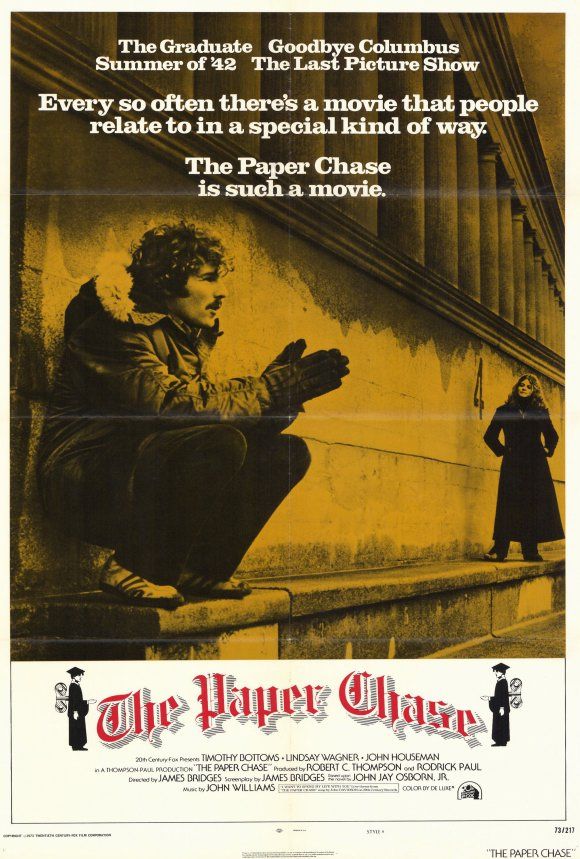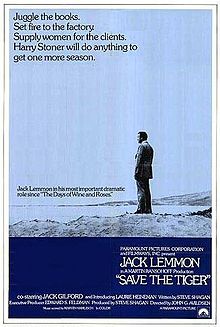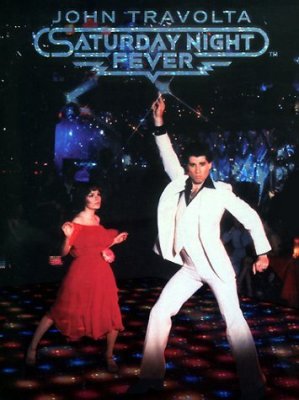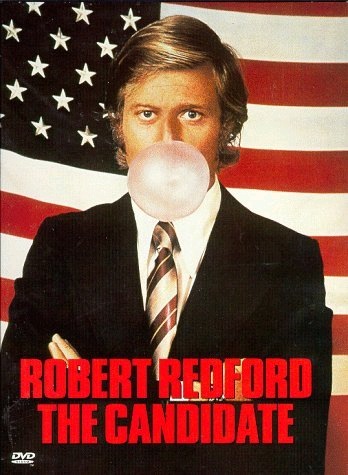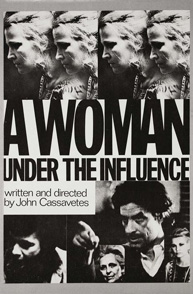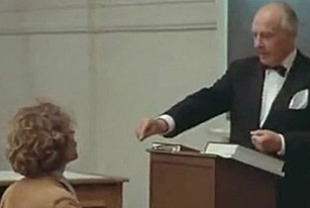
‘The Paper Chase’ — when you want to marry your professor but have to settle for his daughter
No one would dispute that “The Paper Chase” is John Houseman’s movie.
An astoundingly perfect representation of an austere, dominating academic, “Chase” and Houseman were made for each other. A national treasure.
But Houseman is a supporting character. The story of “Chase” is that of Mr. Hart, played by Timothy Bottoms, a law student who is forced to come to grips with … something or other.
Specifically, a strange obsession with one of his instructors.
Depicting difficult coursework is not easy. Nor is doing the work itself. The campus scenes of director James Bridges actually make Harvard Law look like fun. Surrounded by smart people, foxy women, famous teachers. Stay up late, order pizza, sneak into libraries, go swimming. The lectures aren’t boring; they’re showdowns.
The plot is undercooked. Even so, “The Paper Chase” might be the best film ever made about dealing with an authority figure. It is elite for this reason and because it demonstrates the classroom as a venue of great drama. Viewers are compelled to raise their hands and take a shot at Kingsfield. The film suggests that getting through such a place requires something beyond a 190 I.Q., as one character, Ford, boasts. Hart will even warn Ford, who dubs himself a “genius,” that Hart knew a genius at the University of Minnesota who idolized the famous Professor Kingsfield but couldn’t score well enough to get into Harvard. Why that would matter to Ford, who has already made it and is the 5th generation of his family to do so, is unclear. (Why Ford would choose his study group participants sight unseen is also unclear; it’s not like any entered with a reputation.)
The film is not a tutorial on how to get in to Harvard Law School. Our characters are already here, adults, among the best we’ve got, prepared by educators around the country for a few years of sparring with Kingsfield. No one thinks of himself as a fluke.
Most people would presume, probably correctly, that the obstacle to achieving a Harvard law degree is simply admittance. So many talented people do not gain acceptance. Those who do, among the nation's top hyper-elites, are talented enough to make the difficult grades with reasonable effort and, if struggling, figure to have broad support networks.
“Chase,” though, suggests the real obstacle is not the admissions office but the first semester. That’s what separates the lawyers from the also-rans; get through that, it’s like running downhill. Determining how many don’t graduate is difficult; the school doesn’t post a number (at least where anyone can find it). Based on these characters, roughly 16% of students won’t make it, a number that feels high.
Maybe it’s not. Here’s an account of a fellow who was simply continuing his liberal arts education (which may not be dissimilar to where Mr. Hart finds himself), and “I didn’t see anything that was a better option at the time.” He found Harvard Law “a great place to hang out with smart people.” He landed an internship at a hedge fund and said sayonara to HLS after 1 year.
“The Paper Chase” is a 1973 movie but seems as relevant of a guide to law school as any subsequent film. Be prepared; there might be an assignment due on the first day of class. Make friends with the right people, not those who will drag you down. Divide the studying to whatever extent possible. Be aggressive about learning; take a chance, and you’ll get ahead. Avoid the slackers, even if it means renting a hotel room. Accept that some, even with enormous credentials, won’t make it. Maybe most of all: To be the best, you have to care about it to an unusually high degree.
The Harvard Law of “Chase” is an academic “Top Gun,” a bunch of young hotshots who have qualified for the most elite academy. They are cocky, and like at any school, they may well be more talented than their instructors. But they don’t know that yet, evidenced by the perceptive Anderson (Edward Herrmann), who astutely notes, “some of us might have nervous breakdowns.” (As a matter of fact, that’s the beginning of “Top Gun.”)
Hart’s first name is James. How often do you hear that in the film? How “Chase” refers to its characters is a clever device. Harvard Law is not a place for warm, fuzzy acquaintances and lifetime friendships. You’re not quite a number, just a surname with a role to play.
Nearly all of these students will thrive; the challenge is whether they can handle Kingsfield. He’s the standard. No other courses are even shown.
The script only flirts with a necessary bigger picture. These characters are sitting on winning lottery tickets. Most, upon graduation, will soon become high-income Americans. (Student debt is an afterthought; none are shown working jobs while in school, though apparently Hart recognizes someone handling the cafeteria cash register.) The students are overwhelmingly male. In one scene, 3 of the 37 faces in Kingsfield’s classroom are female. Where are these fellows going? Many like Mr. Ford will choose a lucrative career on Wall Street, someday to send the 6th generation back to that very dorm. Others may seek out the U.S. attorney’s office, Hollywood, State Department. One fairly famous graduate decided to be a community organizer in Chicago.
Hart’s motivation is sketchy at best. He seems not the slightest bit prosecutorial. Nor does he care about money. Nor is he political. Why is he there?
We should be able to infer that answer. The most we get, in a feeble bit of scripting, is that he wants to give himself the ultimate classroom challenge, which he has come to learn is Kingsfield.
The script fails to decide whether Hart must conquer Kingsfield or serve him.
We can view Hart as representing the American dream. He’s clearly not a Harvard legacy. He’s just a random extraordinary, overachieving mind, able to join the elites on his own merits and even outduel or train them.
“Hart isn’t a character,” wrote a skeptical Pauline Kael. She’s got a point. Here’s what she misses: Hart’s there, because that’s what he does. He goes to school. He’s good at it. Harvard Law is just the next stage. Hart’s there for the same reason a golfer joins the PGA Tour. Because he can. There’s no downside.
Bottoms, according to Kael, is a “vague, wondering actor.” Roger Ebert, however, in a 4-star review, deems Bottoms an “awfully good actor … natural and unaffected.” Indeed. Bottoms easily finds his place among fellow students. It’s the script’s fault he struggles with the Kingsfields.
It is said on a 2004 DVD interview about the film “The China Syndrome,” an excellent film also directed by Bridges, that Houseman was Bridges’ mentor. Bridges’ recruiting of Houseman, who was not an actor, is one of the greatest discoveries in Hollywood history. Others were considered for the part, including Paul Scofield and Gregory Peck; the book “Inside Oscar” says James Mason “walked out” just before filming and that Houseman recommended Edward G. Robinson, who was too ill for the role. So Houseman accepted. Despite making this incredible casting call and helming a couple other big successes, “The China Syndrome” and “Urban Cowboy,” Bridges’ Wikipedia page is remarkably lean. Jane Fonda said in a 1979 article that Bridges actually “was scared of working with stars.”
While Houseman rightly won an Oscar, Kingsfield is far from complete. He advises presidents. (Apparently Democratic ones, according to mementoes in his study.) He is around age 70. What is his motivation to teach students he professes not to care about? Presumably because it keeps him relevant, so that the people running the country in the 1990s will still be talking about him.
“You teach yourselves the law, but I train your mind,” he tells Hart’s class, an interesting explanation of the purpose of college. “You come in here with a skull full of mush, and you leave thinking like a lawyer.”
It’s hard to say when the term became commonplace (the New York Times twice used it in the 1950s, according to an online search), but Kingsfield must be one of the earliest passive-aggressive film characters. He bears down on students, intellectually but not physically. He takes pleasure neither in nurturing them nor humiliating them. Notice how, when a student is stumped, Kingsfield quickly moves on, no questions asked about preparedness, etc.
“I feel like he knows me … like he cares about how I do,” Hart will say. But other scenes will suggest Kingsfield has no such interest in Mr. Hart.
Lindsay Wagner, as Susan Fields, encounters Hart seemingly coincidentally. Was there really someone stalking her? Perhaps, or perhaps Hart was given a very subtle tryout. (After all, she has the genes of a very savvy person.) Susan is here to give Hart a boundary with real life. To be happy and productive citizens as well as high achieving, Harvard Law students need to find balance. She has that in spades. He tells her what he learns in class and rattles off his agenda. She has long since ceased to care about Hart’s “upper echelon” of law school. At some point, Hart will be out of school, and happiness will not come from doing Kingsfield’s assignments, but from … any number of a host of things.
Susan’s life, were she not still very beautiful, would already be a tragedy. Her boyfriend is far more interested in her father. She’d rather be in Europe, dissolving herself of her failed marriage, but “My mother is in a mental institution,” which apparently requires her attention in Boston. It doesn’t seem that she would be wealthy, even though she curiously tells Hart, “I could buy you.” She may well be an underachiever. Unlike Hart, Susan cares not at all about Kingsfield’s judgment. A very faint analogy can be drawn to “Saturday Night Fever,” in which Tony is a king in one place but a serf everywhere else. In “Chase,” we strongly get the sense that Kingsfield is a king just about anywhere except his own household, where he must support an unimpressed daughter and disabled wife.
Chemistry between Hart and Susan is typical of a college fling. He finds her handy and available. She can’t stand starry-eyed law students. He blames her for disrupting his study habits. Why is she attracted to him? Chances are it’s because he actually pursues her; she’s vulnerable. He’s oblivious to the gravity of her accurate world view and tells her she doesn’t give him much “sustenance.”
The collection of Hart’s classmates is cookie-cutterish, but effective. Mr. Ford is the Richie Cunningham or Brandon Walsh of the group, unfazed, team captain, the reliable center, a beacon of fairness. Mr. “Liberty” Bell is erudite but obnoxious, more talk than action. Mr. Brooks is scared s---less by what he’s seen. All of these people have elite brains, but not all are well-suited to this particular environment, worst of all Mr. Brooks. He’s got a photographic memory, but that doesn’t do him any good as far as analyzing. Except the question he is called out for is a definition, not an analysis.
It would seem Brooks is in the film to represent pressure. The only problem is, Bridges needs an excuse for why Brooks can get in but won’t make it. So Brooks is given a photographic memory with mediocre brainpower. Inadvertently, apparently, Bridges opens the door here to another angle, that intelligence is multifaceted, can’t be defined by a single 3-digit number, that one acknowledged smart person can look very dumb in the presence of another acknowledged smart person. At a minimum, this questionable notion casts doubt on the relevance of LSATs. (Mr. Brooks alas is not as fortunate as Will Hunting, who not only has a photographic memory but can solve proofs that only a handful of people in the world can appreciate.)
“The Paper Chase,” from a novel by John Jay Osborn Jr., does not opine on the merits of the higher education Hart and his classmates are receiving. A cynic could describe law school and the legal profession as a strange tribute to precedence in which human beings assert that the right way to settle disputes is to settle them the way they were previously settled (because no one apparently rioted or started a war afterwards).
But every case is different, the highest court is often divided 5-4, and we’re just making it up as we go along.
Hart curiously tells Susan that in classrooms such as Kingsfield’s, “You’re up against some incredible minds here.” What does the presence of incredible minds have to do with learning the material? If Hart were taking algebra, why would the brains (or lack thereof) of the other students affect his own ability to get it?
If higher education is about learning, why aren’t Kingsfield’s lectures and wisdom open to the public? Unless it’s about exclusivity, in which case … well, there you go.
Though Hart’s emotions are often silly, “Chase” excels when it lets Kingsfield push his buttons. This is how all human beings, at some point in their lives, will react to a teacher, a coach, a boss, maybe even a parent or spouse ... Worshipping the approval of one individual is one of the most counterproductive things a human being can do to himself/herself, but we can’t help ourselves. Perhaps there is something evolutionary in the process.
“Chase” is a 2-hour battle of “Hart” wanting to be “James.” The meager victory is in no longer being “so soft, so easily manipulated.” Within a year, Hart and Kingsfield will be associates, not adversaries. Hart will achieve not just the grade he spurns but that elusive “care,” in the form of run-of-the-mill references for jobs in the White House or State Department. No one believes this ending — we’re sure that Hart, whenever he hears that Kingsfield has critiqued his work, will, unfortunately, always care. Hart really has nothing in common with Susan, but in his strange world of idolatry, marrying her is the next best thing to marrying Kingsfield.
4 stars
(September 2016)
(Updated July 2017)
“The Paper Chase” (1973)
Starring Timothy Bottoms as Hart ♦
Lindsay Wagner as Susan ♦
John Houseman as Kingsfield ♦
Graham Beckel as Ford ♦
James Naughton as Kevin ♦
Edward Herrmann as Anderson ♦
Craig Richard Nelson as Bell ♦
Robert Lydiard as O’Connor ♦
Lenny Baker as Moss ♦
David Clennon as Toombs ♦
Regina Baff as Asheley ♦
Irma Hurley as Mrs. Weasal ♦
Bill Moher as Philip ♦
Blair Brown as Miss Farranti ♦
Richard Whelan as Pruitt ♦
Alan Kwinter as Sanders ♦
Nicholas Olah as Knight ♦
David B. Johns as Fisher ♦
Tony Silverthorn as Hotel Manager ♦
John Bethune as Hotel Clerk ♦
Jan Campbell as 1st Hotel Maid ♦
Dora Dainton as 2nd Hotel Maid
Directed by: James Bridges
Written by: James Bridges (screenplay)
Written by: John Jay Osborn Jr. (novel)
Producer: Robert C. Thompson
Producer: Rodrick Paul
Associate producer: Philip L. Parslow
Cinematography: Gordon Willis
Production design: George Jenkins
Set decoration: Gerry Holmes
Editor: Walter Thompson
Unit production manager: Philip L. Parslow
Casting: Marion Dougherty Associates
Music: John Williams
